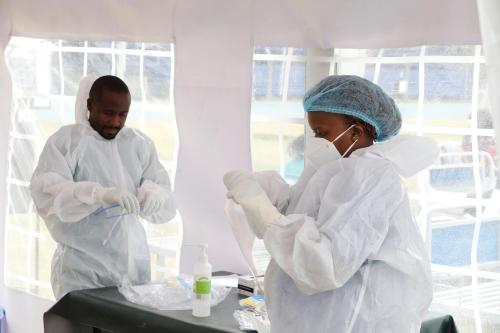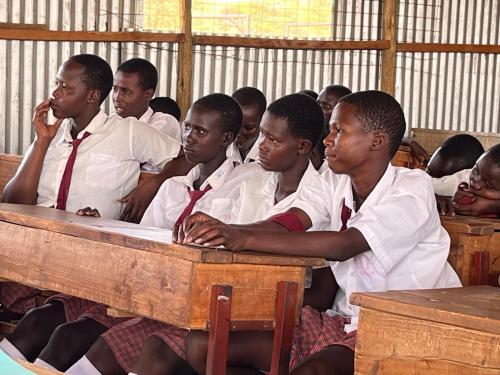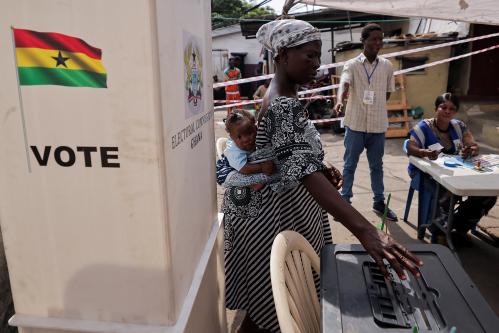Zambia asks to defer its debt payments
On Tuesday, September 22, Zambia’s government announced that it was running out of cash to service its debt, and asked holders of its three eurobonds, worth a total of $3 billion, to defer interest payments worth almost $120 million until April. The deferment makes Zambia the first African country to default on its debt since the start of the COVID-19 pandemic. The government placed blame for the default on a combination of declining revenues—partially driven by decreases in the price of copper, a natural resource that makes up 70 percent of Zambia’s export earnings—and increasing unbudgeted costs caused by the pandemic. As a result of the default, Fitch Ratings downgraded Zambia’s credit rating to “C” from “CC.”
Zambia is not the only African country to face COVID-induced difficulties with debt. Twenty-nine African countries have already participated in the G-20’s Debt Service Suspension Initiative, enacted in April to allow low-income countries to concentrate their resources on fighting the pandemic. For more on this topic, see “The unfinished agenda of financing Africa’s COVID-19 response.”
Parliamentary and trade updates in Kenya
On Monday, September 21, Kenya’s chief justice David Maraga advised President Uhuru Kenyatta to dissolve the country’s parliament, stating that parliament had failed to meet a constitutional provision that stipulates that one-third of seats be occupied by women. Currently, women hold 22 percent of seats in the Kenya’s lower house of parliament and 31 percent in the upper house. In a letter to Kenyatta, Maraga wrote that parliament had “blatantly failed, refused, and/or neglected” to implement the gender rule. However, on Thursday, High Court judge Weldon Korir granted temporary orders stopping the move to dissolve parliament, stating that it raised “substantial questions of law” and ordering a hearing on the issue.
Meanwhile, the United States has stipulated that Kenya support Israel’s political and commercial interests as a condition for a U.S.-Kenya bilateral trade deal currently under negotiation. U.S. objectives include for Kenya to commit to “discourage politically motivated actions to boycott, divest from and sanction Israel” and for the elimination of politically-motivated nontariff barriers on trade from Israel. Lobby groups in Nairobi, Kenya, including the East African Tax and Governance Network and the East African Trade Network, have argued that the inclusion of a third party in the negotiation agenda could make the agreement risky and undercut Kenya’s reputation.
In Kenya news, the country introduced its first licensed investment fund for citizens living overseas. The fund, managed by the African Diaspora Asset Managers investment firm, is expected to provide a safe and regulated means for Kenyans living overseas to invest in development projects across the country. The Kenyan diaspora sent an estimated $3 billion in remittances to Kenya last year, and remittances in the first half of 2020 exceeded those sent in the first half of 2019 despite volatility due to the COVID-19 pandemic.
Political updates in Somalia and Ethiopia
On Wednesday, September 23, Somalia’s parliament unanimously confirmed Mohamed Hussein Roble as the country’s new prime minister. Earlier this year, the parliament removed now-former Prime Minister Hassan Ali Khaire from the position in a no-confidence vote, citing his inability to prepare for democratic elections and manage the unstable security situation posed by al-Shabaab militants. Roble, who previously worked at the International Labor Organization, was appointed as Somalia announced its plan for the upcoming elections.
Notably, in recent months, Somalia has been in talks to revise its electoral system, with initial moves to reform the system to one-person, one-vote as opposed to its current clan-based voting system. The proposed reforms for universal suffrage will not be enacted, however, as the authorities confirmed that the upcoming legislative election will see electoral delegates vote in the members of parliament, who will then elect the president in early 2021, a format similar to that of elections in recent years. Importantly, the upcoming elections will include double the number of delegates of previous ones. Meanwhile, attacks by al-Shabaab (and responding U.S.-led airstrikes) continue, which experts predict will only increase as the election moves closer as al-Shabaab seeks to exploit the fragility of governance institutions and thwart the election.
Meanwhile, Ethiopia continues to face domestic unrest. Spurred by the death of pop star and activist Hachalu Hundessa of the Oromo ethnic group earlier this summer, internet shutdowns, protests, and reactive violence have continued in recent months, leading to the deaths of hundreds. Already, about 2,000 people have been charged in the related violence, including prominent opposition figure Jawar Mohammed, who was charged with terrorism-related offenses, telecom fraud, and other crimes relating to the violence that erupted in July.
In Ethiopian economic news, in an effort to block illegal trade, illicit financial flows, and cash hoarding, the government announced a new set of bank notes earlier this month. Importantly, Ethiopians must replace their old notes in just three months. According to Quartz Africa, local banks have been calling for such a move in recent years, as over 113 billion Ethiopian birr circulates outside of the formal banking system, which creates liquidity problems for the banks.
The Brookings Institution is committed to quality, independence, and impact.
We are supported by a diverse array of funders. In line with our values and policies, each Brookings publication represents the sole views of its author(s).





Commentary
Africa in the news: Zambia’s debt, Kenya’s parliament and trade, and politics in the Horn of Africa
September 26, 2020